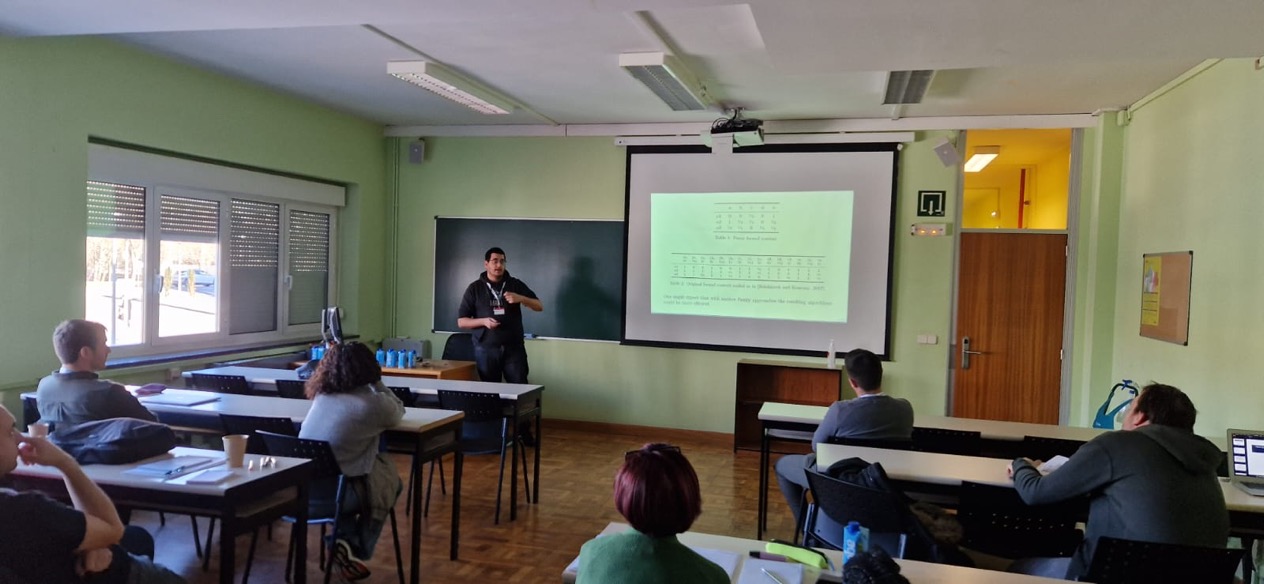February 2024
Journal paper accepted: Mathematics
13/02/24/10:27 Filed in: Journal paper
C. Bejines, M. Ojeda-Hernández, D. López-Rodríguez. Analysis of fuzzy vector spaces as an algebraic framework for flag codes. Mathematics. 2024
ABSTRACT Flag codes are a recent network coding strategy based on linear algebra. Fuzzy vector subspaces extend the notions of classical linear algebra. They can be seen as abstractions of flags to the point that several fuzzy vector subspaces can be identified to the same flag, which naturally induces an equivalence relation on the set of fuzzy vector subspaces. The main contributions of this work are the methodological abstraction of flags and flag codes in terms of fuzzy vector subspaces, as well as the generalisation of three distinct equivalence relations that originated from the fuzzy subgroup theory and study of their connection with flag codes, computing the number of equivalence classes in the discrete case, which represent the number of essentially distinct flags, and a comprehensive analysis of such relations and the properties of the corresponding quotient sets.
Participation WoFTU'24
12/02/24/13:00 Filed in: Workshop participation
Workshop on Formal Treatment of Uncertainty in Knowledge-Based Systems, Cádiz, February 8-11, 2024
This workshop is focused on creating synergies between academia, industry and third party partners to promote new challenges and projects in the framework of uncertainty in Artificial Intelligence.
We participated with two contributions and one tutorial:
Tutorial: Domingo López. fcaR, Formal Concept Analysis with R.
* Carlos Bejines: Aggregation Functions for uncertainty management.
* Domingo López: Concept lattice-based polarity analysis in texts.
* Manuel Ojeda-Aciego: f-inclusion for the design of deductive automatic systems.
Participation RSME 2024
06/02/24/10:54 Filed in: Conference participation | Chairing
Congreso Bienal de la Real Sociedad Matemática Española. Pamplona, 22 - 26 enero 2024
Manuel Ojeda-Hernández was co-organizer of the special session "Mathematical Developments in Artificial Intelligence and Machine Learning", which turned out to be the one which attracted most papers out of the 25 different special sessions.
He also presented a paper entitled "Algoritmos CbO para el cálculo del retículo de conceptos".

Conference papers accepted: ESCIM
06/02/24/10:27 Filed in: Conference papers
I. Perfilieva, N. Madrid, M. Ojeda-Aciego, P. Artiemjew, A. Niemczynowicz. Extreme Learning Machine as a New Learning Paradigm: Pros and Cons. Eur. Symp. on Computational Intelligence and Mathematics, ESCIM, 2024.
ABSTRACT We analyze the validity of the Extreme Learning Machine principles proposed as a new learning methodology for Single Layer Feedforward Neural Networks. We show that despite the empirical success of ELM, its theoretical platform does not have a rigorous mathematical justification. To do this, we show that two main statements in its seminal paper do not have correct proofs and are in fact incorrect. Moreover, we create a dataset that provides a counterexample to the theoretical assertions done about the ELM learning algorithm.
F. Pérez-Gámez, C. Bejines, P. Cordero, D. López-Rodríguez, M. Ojeda-Hernández. Inheritance of completeness between systems of strong and weak implications. Eur. Symp. on Computational Intelligence and Mathematics, ESCIM, 2024.
ABSTRACT The study of unknown information in formal contexts can be done from two extremely different points of view: working just with the information available at the moment, or exploring all the different values that the unknown information can take.
From these two perspectives, we obtain two kinds of attribute implications: the weak ones which are the attribute implications that hold with the current amount of information, and the strong ones which will also hold under any update of the context. We study whether, given a complete system of weak implications concerning partial formal context, one can extract a complete system of strong ones concerning the same partial formal context.
D. Pérez-Medina, N. Madrid, P.A. Kowalski. Legal and technical challenges of AI in the field of Criminal investigations. Eur. Symp. on Computational Intelligence and Mathematics, ESCIM, 2024.
ABSTRACT This article addresses critical challenges in the intersection of artificial intelligence, crime investigation and digital forensics, particularly in light of the
proposed Regulation on Artificial Intelligence in the European Union. The focus is on mitigating biases caused by databases and algorithms, with real-world examples
highlighting discriminatory biases in criminal proceedings. The article emphasises the necessity of addressing biases in both data and algorithmic decision-making to
ensure fair outcomes. Another key concern explored is the lack of traceability in AI-based decisions, posing challenges to accountability and transparency, especially,
in the context of criminal investigations. Additionally, the article delves into the protection of private and family data in the vast datasets analysed by AI systems, referencing a legal case that underscores the potential violation of the right to a fair trial. To address this, the article proposes the development of anonymisation
systems to safeguard individuals’ privacy rights. The overarching theme is the need for ethical considerations and legal frameworks to guide the responsible development and deployment of AI tools in digital forensics.
Participation FSTA 2024
05/02/24/13:20 Filed in: Conference participation
Fuzzy Sets Theory and Applications, Liptovský Ján, Slovak Republic, Jan 28-Feb 2 2024
We presented two works "An FCA-based approach to RDF graphs" (presented by Manuel Ojeda-Aciego) and "Close-by-One strategy for computing the fuzzy concept lattice" (presented by Manuel Ojeda-Hernández).
A nice workshop, plenty of scientific and cultural activities, in which we found some time to work on forthcoming research topics with our collaborator Irina Perfilieva.

